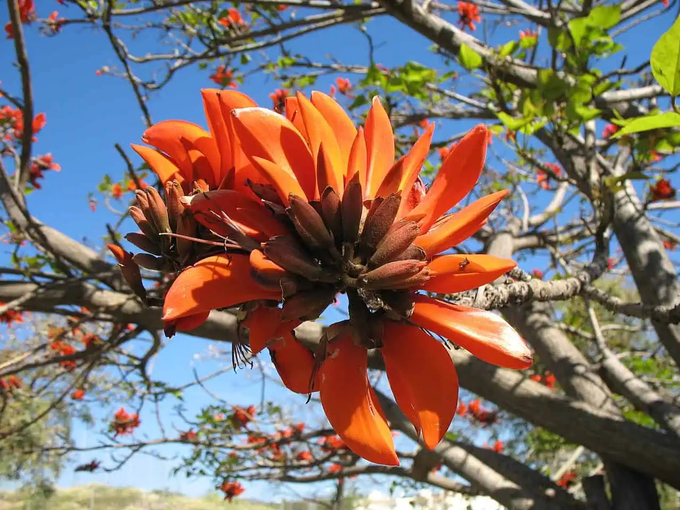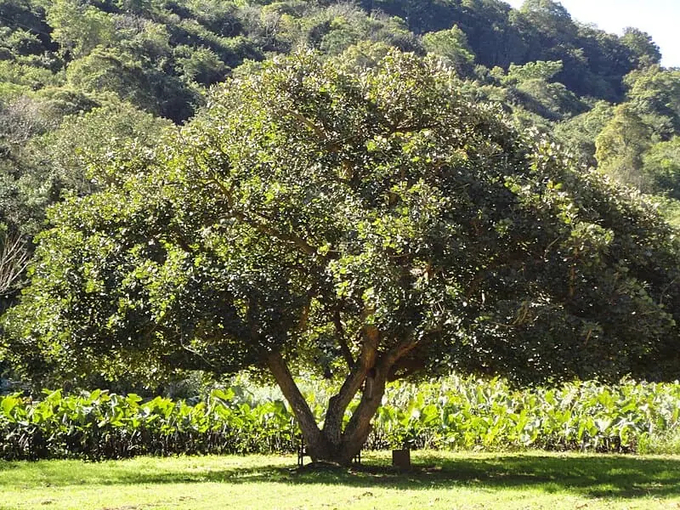June 17, 2025 | 15:59 GMT +7
June 17, 2025 | 15:59 GMT +7
Hotline: 0913.378.918
June 17, 2025 | 15:59 GMT +7
Hotline: 0913.378.918

Some researchers believe that the scientific name of the African coral tree is racist in its naming. Photo: Wikimedia Commons.
Recently, scientists have proposed changing the names of plants that include racist language. They are also advocating for the establishment of a council to review and recommend new names to replace inappropriate ones. This initiative is expected to begin in 2026.
Alina Freire-Fierro, a botanist from Cotopaxi Technical University (USA), is among those leading the call for a vote to change these offensive plant names. At the International Botanical Congress, held in Madrid, Spain, she urged, “The time has come to act and eliminate names that are no longer appropriate.” The secret ballot at the event drew 556 botanists, with 63% in favor of the proposal.
One specific proposal suggests removing the letter “C” from over 300 scientific names of plants, algae, and fungi. For example, a plant species with the phonetic name Caf[e]r- or Caff[e]r-, named during the apartheid era in South Africa (1948–1994), has been suggested to be renamed Affra, which means the plant is native to Africa. This change would make the name neutral, avoiding any discriminatory connotations.
The problem is the tree’s scientific name - Erythrina caffra. That second word likely originally referred to the area where the tree was found. It derives from the Arabic word for “infidel,” but it came to be used as a racial slur against Black people in South Africa and elsewhere.
Gideon Smith, a botanist and plant taxonomy expert at Nelson Mandela University, stated, “We are grateful for the global support of our colleagues, who have helped us build a strong case for removing names that are sensitive and remind people of historical periods best left in the past.”
Since 2021, this issue has sparked debate and garnered increasing attention. Some researchers support the restoration of native names for plants while advocating for the removal of offensive ones. For example, the plant species Hibbertia was named after George Hibbert, an English amateur botanist and contributor to the anti-slavery movement in the late 18th and early 19th centuries. While the name "Hibbertia" is not inherently offensive, some scientists have still proposed eliminating names that honor individuals. They argue that naming plants after people is no longer in line with modern principles of equality and representation for all.

The coral tree, formerly known as Erythrina caffra, has now been changed to Erythrina affra. Photo: Wikimedia Commons.
However, this viewpoint has faced opposition from other scientists, who believe that scientific nomenclature – the formal system used to name species – should remain uninfluenced by contemporary social movements or controversies. They argue that this naming system is designed to be stable and that changes based on temporary social or political trends could undermine its integrity.
Botanical taxonomists are generally hesitant to change plant names, as doing so can cause significant issues, such as confusion within existing databases or even legal challenges. Nevertheless, at the International Botanical Congress, scientists voted in favor of changes that contradicted a decision made the previous year by the International Commission on Zoological Nomenclature. That committee had decided it would not consider altering animal species names, even when certain names were deemed offensive.
“Even minor changes, such as altering a single consonant in a name, can have unintended consequences,” remarked an expert from the Belgian Botanical Garden who attended the event, underscoring the tension and conflict that marked the discussion.
During the congress, botanists also debated a proposal to broaden the scope of name changes to include those deemed culturally offensive. The proposal called for the establishment of a standing committee dedicated to handling future decisions regarding name revisions.
However, before the vote took place, the proposal was modified. Rather than creating a new group, it was agreed that an existing committee—currently responsible for evaluating names that are ineligible for other reasons—would take on the task of reviewing requests for changes to names considered offensive.
The committee will only address complaints concerning new scientific names published after January 1, 2026, and retroactive changes to existing names will be limited to exceptional cases where it serves the public interest. A representative from the scientific community commented, “We can address issues with new names, but it’s clearly less problematic than dealing with names that are already in use.” For botanists who remain committed to changing offensive plant species names that are already established, the matter will be revisited and reported at the next session of the International Botanical Congress, which will be held in six years.
Translated by Quynh Chi

(VAN) Extensive licensing requirements raise concerns about intellectual property theft.

(VAN) As of Friday, a salmonella outbreak linked to a California egg producer had sickened at least 79 people. Of the infected people, 21 hospitalizations were reported, U.S. health officials said.

(VAN) With the war ongoing, many Ukrainian farmers and rural farming families face limited access to their land due to mines and lack the financial resources to purchase needed agricultural inputs.

(VAN) Vikas Rambal has quietly built a $5 billion business empire in manufacturing, property and solar, and catapulted onto the Rich List.

(VAN) Available cropland now at less than five percent, according to latest geospatial assessment from FAO and UNOSAT.

(VAN) Alt Carbon has raised $12 million in a seed round as it plans to scale its carbon dioxide removal work in the South Asian nation.

(VAN) Attempts to bring down the price of the Japanese staple have had little effect amid a cost-of-living crisis.